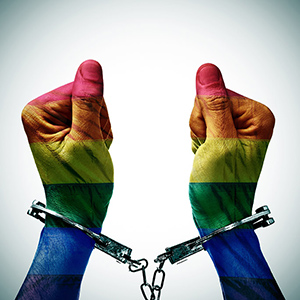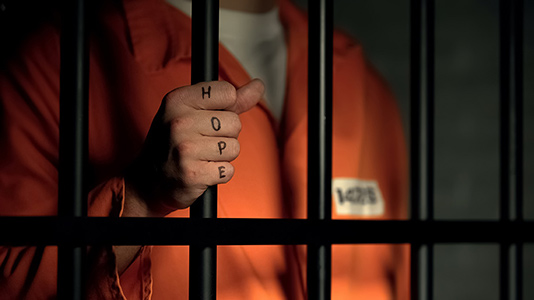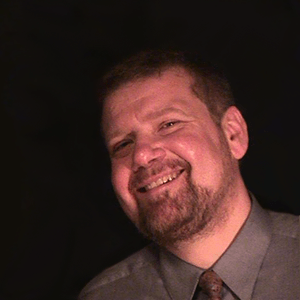© 1988 Rich Grzesiak, all rights reserved.

The State of California and the County of Los Angeles prison systems are responsible for the unchecked transmission of the AIDS virus among gay inmates despite attempts to segregate prisoners who are HIV from those who are not.
Recent initiatives to require "three strikes you're out" types of mandatory sentencing procedures will accelerate the transmission of HIV through the growing prison population of the State of California.
The medical treatment of prisoners is hampered by perfunctory treatment from institutional health providers, including state nurses and doctors. Trial drugs for treatment of AIDS are not available to prisoners.
There have been incidents in the L.A. County prison system where PWA's have allegedly been denied access to medication despite explicit court orders from a county judge, with possible violations of federal civil rights laws. The practice of denying AZT and related medications to PWA's held in the County prison system has generated at least one, and possibly several more, law suits filed with the federal district court for Los Angeles.
There is growing evidence HIV+ prisoners released on parole have a higher than average recidivism rate.
California state prison officials, like their counterparts in other states, will not permit the distribution of condoms through the prison system—they will not even acknowledge the occurrence of sex, especially coercive sex, in the state prison system, despite overcrowding. The California prison system remains in an aggravated state of crisis management which is severely impacting on the spread of AIDS and the treatment of HIV among inmates.
Support systems designed to nurture spirituality—like MCC's "Spirit of Hope" for gay prisoners at the California Men's Colony at San Luis Obispo and "Free Spirit MCC" for lesbian inmates at Pomona—remain seriously underfunded, able to function only once per month.
Throughout the correctional system, a sense of denial persists that a crisis exists. A U.S. Supreme Court ruling last summer may force the hand of prison authorities, however, in its affirmation of prisoner rights and the responsibility of state officials to protect inmates at risk. Inmates may finally be able to sue if they are raped and put at risk for HIV.
These are among the findings of a special FRONTIERS inquiry into the dynamics of AIDS among prisoners.
FRONTIERS talked to a number of lawyers, state officials, HIV rights activists and social work professionals, including an MCC minister and a former inmate (who wished to remain anonymous). Their comments paint a bleak portrait of a system despairing of solutions, and inmates so despondent some contemplate suicide.
Matthew May is legal coordinator of the Legal Services Department's Client Services component at the Gay and Lesbian Community Services Center of Los Angeles. While he's not an attorney, he's almost as busy, juggling phone calls and appointments from many different parts of the gay community. It would be easy for one client to blur into yet another for him.
This wasn't the case for a recent incident he described concerning a mother, distressed because her incarcerated son was being refused a transfer in the California state prison system by corrections officials.
"Her son was being harassed, agitated, really stressed out. The state knew of his HIV condition... and that he was threatened, and they weren't moving him to another location."
So the inmate's mother came to Legal Services to appeal to its lawyers for help. There was no good news: May reports "the mother didn't have a legal position to stand on because the son had to get his own legal representative. She and the son couldn't afford it. It was a very frustrating situation to have no alternative and no one to turn to because they're not providing legal representation to gays and lesbians with a full understanding that HIV and AIDS issues in prison are a whole dynamic that's not being addressed."
May is very critical of prison officials who "don't know the dynamic of how [HIV] can progress through stressful environments... making the person more severely sick, how that potentially shortens the life of not only the person incarcerated, but [even] when they're let out there are repercussions. There are other cases that have come through the Clinic where the individual was just completely refused their medication at a time when they needed it. They were so frustrated by the situation that when they got out, their own doctors testify this person's life has been shortened... as a result of not receiving medication on a timely basis."
The negligence of those incarcerating you is the responsibility of the State or County. The Community Center's legal department frequently gets clients eager to seek possible legal redress for these actions.
May's advice to prison officials is that "they take the disease, the condition and the circumstances all into consideration when the person is being incarcerated... I would have a doctor certified examination or supportive medical information on the person's condition prior to being incarcerated so they know how to properly place them."
"I'm not saying isolation into a completely separate area, but a more sensitive area... something more quasi-incarceration/medical. These people aren't in good health and are only going to be damaged by the incarceration."
"There's a lack of state commitment to effective education and information about an individual's treatment. In many cases, even for people in the system who are trying to react, I wouldn't be too confident because of the way the state is telling them how to do it. The people evaluating who gets segregated [into HIV only facilities] needs to be completely upgraded."
The bottom line is "people are getting infected in prison... People in maximum security are being affected to the point where their condition mitigates their security restraints."
It's a grim assessment May makes of California penitentiary authorities: "They look on AIDS as an individual fault: 'It's your fault you got it'. The state acknowledges the possibilities, but they don't put themselves in the position of responsibility."
And with no condoms being distributed through the California state prison system, the rate of AIDS transmission grows and grows and grows.
On February 8, 1994, attorneys Jeff Thomas and John Duran filed a suit in federal district court against the County of Los Angeles for denial of medication to a gay prisoner who has AIDS. That individual is Michael W. Kolcum. His trial begins in April 1995.

L.A. County made a motion to dismiss the complaint on all grounds, claiming federal law didn't allow such a suit. The judge denied it. The case is now entering a discovery phase.
Kolcum was picked up in Long Beach in the summer of 1993 on a DUI charge and then transferred to Central Jail in Los Angeles because of an unpaid fine on a prior DUI. According to his attorney, Kolcum had to make a couple of court appearances to get them cleared up. While County officials held Kolcum over a 12 day period, they did not comply with a Long Beach judge's order that Kolcum be supplied with his prescribed dosage of AZT.
"I want to change the system by this lawsuit," attorney Thomas declares. "This isn't an isolated problem but a de facto policy—denial of medication in jail to people with HIV is widespread in the L.A. County system and we want to do what we can to change that. And my client deserves fair compensation for the hell he went through when he was in jail with AIDS, being denied his medication. That trauma continued for a time after he was released."
Kolcum was diagnosed as having AIDS several years prior to being taken into custody and was on AZT pursuant to his own physician's prescription for several years before being picked up on the DUI.
When Kolcum was arrested, he appeared in front of Long Beach Municipal Court Judge Liu: Liu ordered L.A. County to provide Kolcum with AZT as long as he was in their custody.
Thomas charges "that order was ignored. My client went through three facilities, repeatedly asked for his AZT, repeatedly said, 'This is my doctor's name, call him if you need to, this is my dosage, I've been on it forever, I have a medical order from Judge Liu,' and he got a grand total of one tablet."
Thomas wants "this case to be a full frontal assault on the County of Los Angeles and the medical system in its jails. We're pulling in a dozen depositions from experts around the country... In order for us to win we've got to prove Mr. Kolcum's is not an isolated case, but a whole lot of people have been treated this way."
[If you're HIV or a PWA and have experienced this treatment in the L.A. County prison system, please call Jeff Thomas at (213) 476-7311.]
32 year old Gilbert Bazan works as a treatment advocate for the Tarzana Treatment Center for a prisoner pre-release program called "Transitional Case Management."
He reports "the recidivism rate among the HIV population coming out of prison is higher than the average prison population. Some prisoners actually think that if they have medical problems, it's better to be in prison for treatment. Many HIV affected inmates being released back into the community are literally struggling for their lives."
He's pretty negative on what HIV affected inmates face behind the walls of the prison system: "There's substandard care there, doctors who may not want to deal with this population at all, but they're doing it: it's prison health care. You have no access to clinical trials, limits on the amount of blood work they're willing to do on you, etc."
"Nurses in prison aren't really capable of handling the medical needs of all these people," Bazan claims. "They'll tell prisoners that if you test HIV+, they're gonna have to ship you to another prison—so if someone is close to being released they'll even tell them, 'Well, wait til you get on the street before you do the HIV test.'"
One of the leading authorities on prison sociology is Dr. Wayne S. Wooden. Dr. Wooden is co-author with Jay Parker of Men Behind Bars: Sexual Exploitation in Prison [DaCapo; $9.95/softcover]. He's also a Professor of Sociology and coordinator of the Criminal Justice & Corrections Program at Cal-Poly Technical University at Pomona. Dr. Wooden's most recent book is entitled Renegade Kids, Suburban Outlaws [Wadsworth Press].
Although the basic research for his book was conducted over 15 years ago, Wooden believes there have been no major, facility wide studies of inmate behavior other than in Nebraska [see below] since 1980.
The data reported by Wooden is chilling. Although there are the same ratios of gays to non-gays in the prison system [as in society] he studied, 41% of homosexuals reported they were forced into sex, 2% of bisexuals, and 9% of heterosexuals. 65% of inmates he studied reported having sex with other males, including 55% of heterosexual inmates. There is no reason to believe these statistics have changed: they have probably risen over time.
A recently conducted statewide Nebraska study on the effect of prison rape reported that 14% suffered a sexual assault.
The implications of these statistics for AIDS/HIV transmission are ominous. Since 1982, what used to be single cell prisons have become double cell. In California it's often triple or quadruple cells, or even a dormitory, "open bay" type. There are one million prisoners in the U.S. today.
What's even more chilling, according to Wooden, is that the type of inmate who's going to engage in coercive sex (i.e., rape) is not going to be an inmate who is going to take the time to use a condom.
Who commits forced sex, or rape, in prison? Wooden tells me it's usually "a self-identified heterosexual male (a 'jocker' or 'stud'), frequently married and receiving conjugal visits. Even though, historically, conjugal visits were viewed as an opportunity to discharge sexual tension in prison, this person would frequently 'turn out'or force another heterosexual male in prison to have sex."
"Sex in prison is, like rape, a display of aggression," Wooden contends. "Sex in prison is dominated by the inmate/convict code: the penis is a weapon of control and dominance and a display of aggression. That is probably increasing because of overcrowding..."
Ironically, "the homosexual... is not being singled out as a coital partner, in part because inmates may fear that that inmate may be carrying HIV or AIDS. The really vulnerable ones are bisexuals and heterosexual passive ones."
Trying juveniles as adults, a new dynamic in the courts, will, when combined with the "3 Strikes You're Out" phenomenon, produce more and more "punks": younger inmates housed in adult prisons who will try to fight back against rape. Wooden stresses "the dynamic of coercive prison sex. The need is to 'break a bronco,' force sex on someone, 'turn them out,' be in control. So the younger, middle class white inmate will wind up being viewed as a prize item."
These trends will work to accelerate the rate at which the AIDS virus is transmitted in prison—since rapists tend not to use condoms. Even if they did, prison officials will not permit their distribution. As prisoners are paroled or return to society, or as their wives return from conjugal visits, the AIDS virus will accompany them.
The set policy is that there is no sex in prison which Dr. Wooden believes is "the classic denial that these things take place. The U.S. Supreme Court decision may force a rethinking of this as inmates may be able to legally argue they were placed at risk [for HIV] and the prison administration knew about it. With 'three strikes' being applied as a sentencing policy, and prison overcrowding already extant, there will be greater incidents of sexual assault."
"Even if you segregate HIV+ prisoners from those who are HIV-, that doesn't necessarily mean HIV transmission won't occur because of conjugal visits taking place," he adds.
Dr. Wooden supports making condoms available or any policy that would protect at least someone from getting HIV. California prison officials, sadly, don't agree.
Reverend Joseph Picari is a minister at the Metropolitan Community Church (MCC) stationed in Ventura. On the third Sunday of each month, he makes the long trip by car to the California Men's Colony at San Luis Obispo where he is also Pastor of the "Spirit of Hope" MCC for gay inmates. He's been doing it for over a year.
"[They're] grateful for a chance to worship as a group and know God loves them, too, as much as anybody else—and accepts them for who they are," he tells me. "When I'm not there, the men have a regular Sunday service, which they conduct themselves."
Some 40 to 50 men attend MCC's services. (Rev. Picari works with the Rev. Warren Alderson, a full-time chaplain on the prison staff. There's a parallel ministry for lesbian inmates, "Free Spirit MCC," in Pomona, supported by MCC Los Angeles).
"I've gotten to know a number of men who are spirit filled, who, despite the fact they're incarcerated for quite a long time, are able to maintain a positive outlook on their own life in relationship to God and each other," he says. What's more, he tells me he "never [has] any fear whatsoever going into the prison," which is surprising given that the facility is a medium security one.
One of his goals is to form a team which would offer gay prisoners a Christian ministry. But a basic problem is the expense. [MCC actively solicits donations, which may be mailed to the Southwest District UFMCC, 11012 Ventura Boulevard, Suite 1254, Studio City, CA 91604; "ATTN: Prison Ministry"].
While some gay prisoners are very much moved by [having] God in their life, there is another extreme—those who are just depressed being there. Just last month, a "lifer," someone fairly young, approached Picari to complain he couldn't go on. "I can't give you permission to commit suicide or anything," Picari counseled him, but the lifer replied, "'I'm gonna contract AIDS.' That was his solution because he knows he'd die from AIDS in some period of time."
Picari reports some members of his MCC "parish" have regular partners, and there are some who are "institutionally gay"—they're heterosexual on the outside, but because they have no other sexual outlet in prison, they'll partner up and essentially have a "wife" in prison.
"Last year there was a case [of rape] and previous ministers had people report that as well," Picari says. "[Inmates] are afraid to do anything about it because of fear of further problems. There's really nothing we as ministers can do about it."
Picari is anxious to strengthen his ministry: "A number of inmates getting ready to leave want information on where MCC is in their home town... The more we can be there, the more people will feel connected with MCC."
In MCC, sex is not a dirty word, sex is part of life, and Picari believes "there needs to be respect for the other person one has a relationship with. Because there is such a danger... of contracting AIDS or any other communicable disease, I think it's very important [condoms] are made available. It's gonna happen whether the prison officials accept it or not."
"I come away from my ministry there with a tremendous sense of gratitude," Picari says. "The prisoners talk about rules and regulations they have to follow, and it's hard to imagine having to do that... You can see it in their eyes, in the way they react..."
This piece originally appeared in FRONTIERS. "Frontiers was Southern California's oldest and largest lesbian, gay, bisexual, transgender magazine. Founded in 1981, it was distributed freely at gay bars, clubs and businesses throughout Southern California. It ceased publication on 09/23/16."
For more about FRONTIERS, please see https://en.wikipedia.org/wiki/Frontiers_(magazine).
